Archive for September, 2013
» posted on Monday, September 30th, 2013 by Linda Lou Burton
Hardy As A Rock
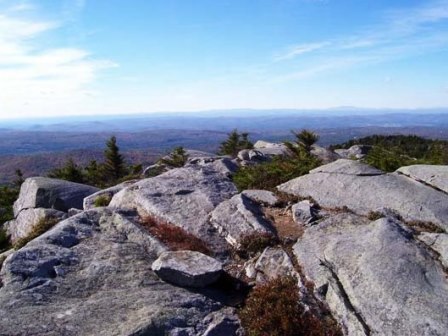 Linda Burton posting from Concord, New Hampshire – New Hampshire is the Granite State. So called, it is said, due to its extensive granite formations and quarries. But I don’t think that’s the only reason. Consider the state motto, proudly displayed on the state coin and every license plate: Live Free Or Die. Such is not the motto of the wishy-washy, or the faint of heart. New Hampshire isn’t very big – 190 miles from top to bottom and no more than 68 miles wide, ranked 46th among the states in area. New Hampshire doesn’t have a lot of people – a little over 1.3 million, ranked 42nd among the states in population. But New
Linda Burton posting from Concord, New Hampshire – New Hampshire is the Granite State. So called, it is said, due to its extensive granite formations and quarries. But I don’t think that’s the only reason. Consider the state motto, proudly displayed on the state coin and every license plate: Live Free Or Die. Such is not the motto of the wishy-washy, or the faint of heart. New Hampshire isn’t very big – 190 miles from top to bottom and no more than 68 miles wide, ranked 46th among the states in area. New Hampshire doesn’t have a lot of people – a little over 1.3 million, ranked 42nd among the states in population. But New 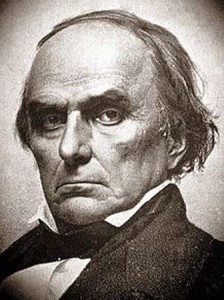 Hampshire was the first of the colonies to break away from Great Britain (January 1776); six months later it became one of the original thirteen states and the first to have its own state constitution. Look at some of the outspoken and daring people who have come out of New Hampshire: orator and statesman Daniel Webster (right, 1782-1852); reformer and newspaper editor Horace Greeley (1811-1872); Christian Science founder Mary Baker Eddy (1821-1910); the first American in space, astronaut Alan Shepard (1923-1998); author of the bestselling and controversial Da Vinci Code, Dan Brown (b 1964). These are not people who coasted along on the Status Quo. They had their opinions, and they acted on them. In fact, the opinion of everyone in New Hampshire
Hampshire was the first of the colonies to break away from Great Britain (January 1776); six months later it became one of the original thirteen states and the first to have its own state constitution. Look at some of the outspoken and daring people who have come out of New Hampshire: orator and statesman Daniel Webster (right, 1782-1852); reformer and newspaper editor Horace Greeley (1811-1872); Christian Science founder Mary Baker Eddy (1821-1910); the first American in space, astronaut Alan Shepard (1923-1998); author of the bestselling and controversial Da Vinci Code, Dan Brown (b 1964). These are not people who coasted along on the Status Quo. They had their opinions, and they acted on them. In fact, the opinion of everyone in New Hampshire 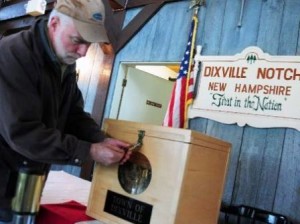 takes the national spotlight on a recurring basis – with both the New Hampshire primary, and the casting of the first votes in the Presidential election. Only a few delegates are chosen in the New Hampshire primary, but it often changes the face of national politics. Along with the first caucus in Iowa, it is a major testing ground for all party candidates, garnering massive media attention. And then, there’s Dixville Notch. » read more
takes the national spotlight on a recurring basis – with both the New Hampshire primary, and the casting of the first votes in the Presidential election. Only a few delegates are chosen in the New Hampshire primary, but it often changes the face of national politics. Along with the first caucus in Iowa, it is a major testing ground for all party candidates, garnering massive media attention. And then, there’s Dixville Notch. » read more
» posted on Saturday, September 28th, 2013 by Linda Lou Burton
Another Blue Day
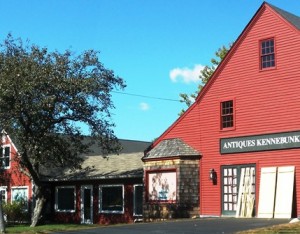 Linda Burton posting from Concord, New Hampshire – It was a Thomas Carlyle kind of day. I knew that the moment I saw the sun come up over the Maine woods behind the hotel. So here hath been dawning another blue day. It was crystal clear and the outside air seemed to sparkle; I moved the Scion to the front and began to load up. Carlyle must have seen a similar sunrise when he wrote his poem back in the 1800s. Think! Wilt thou let it slip useless away? That was Carlyle’s admonition and the folks of Maine were paying heed; hundreds of events were scheduled for the Great Maine Outdoor Weekend on this first weekend of autumn. As for me, it was moving day; time to relocate from Augusta, Maine to Concord, New Hampshire, capital city #43. Jack Cat seemed peppy to go, eyes bright and ears alert, but Alex Cat doesn’t read poetry; he chose to disappear under the dark, dusty bed out of my reach, ignoring me as I chanted the poem’s next line. Out
Linda Burton posting from Concord, New Hampshire – It was a Thomas Carlyle kind of day. I knew that the moment I saw the sun come up over the Maine woods behind the hotel. So here hath been dawning another blue day. It was crystal clear and the outside air seemed to sparkle; I moved the Scion to the front and began to load up. Carlyle must have seen a similar sunrise when he wrote his poem back in the 1800s. Think! Wilt thou let it slip useless away? That was Carlyle’s admonition and the folks of Maine were paying heed; hundreds of events were scheduled for the Great Maine Outdoor Weekend on this first weekend of autumn. As for me, it was moving day; time to relocate from Augusta, Maine to Concord, New Hampshire, capital city #43. Jack Cat seemed peppy to go, eyes bright and ears alert, but Alex Cat doesn’t read poetry; he chose to disappear under the dark, dusty bed out of my reach, ignoring me as I chanted the poem’s next line. Out  of eternity this new day is born. Into eternity at night, will return. Uninspired, he didn’t budge. I called for front desk help; two
of eternity this new day is born. Into eternity at night, will return. Uninspired, he didn’t budge. I called for front desk help; two 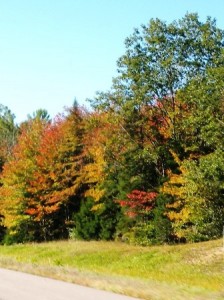 strong-armed guys came and lifted the mattress. One cat, caught; goodbye to Brenda, goodbye to Matisse; into the car; we’re off. The ramp for I-95 south was just across the street; my plan was to stop at Portland and Kennebunk for a glimpse of both large and small towns on the famous Maine coast. And then, New Hampshire. The road was smooth, the traffic was moderate, the trees were just beginning to color up, and Thomas Carlyle repeated himself: Here hath been dawning another blue day. Think! Wilt thou let it slip useless away? Not me Thomas. Just watch. » read more
strong-armed guys came and lifted the mattress. One cat, caught; goodbye to Brenda, goodbye to Matisse; into the car; we’re off. The ramp for I-95 south was just across the street; my plan was to stop at Portland and Kennebunk for a glimpse of both large and small towns on the famous Maine coast. And then, New Hampshire. The road was smooth, the traffic was moderate, the trees were just beginning to color up, and Thomas Carlyle repeated himself: Here hath been dawning another blue day. Think! Wilt thou let it slip useless away? Not me Thomas. Just watch. » read more
» posted on Monday, September 23rd, 2013 by Linda Lou Burton
Part Of The Process
 Linda Burton posting from Augusta, Maine – “There’s not much legroom under the desks,” said Dan, pulling out the wastebasket for us to see, “so people tend to set these behind their chairs.” He proceeded to demonstrate how crowded that made the walking space for getting in and out. “Big feet like mine are prone to trip,” he continued, “but little kids can zip through in a flash.” Dan Fournier, our guide in the Maine State House this morning, was explaining the Honorary Page Program, which allows even very young Maine students to spend a day working in the
Linda Burton posting from Augusta, Maine – “There’s not much legroom under the desks,” said Dan, pulling out the wastebasket for us to see, “so people tend to set these behind their chairs.” He proceeded to demonstrate how crowded that made the walking space for getting in and out. “Big feet like mine are prone to trip,” he continued, “but little kids can zip through in a flash.” Dan Fournier, our guide in the Maine State House this morning, was explaining the Honorary Page Program, which allows even very young Maine students to spend a day working in the 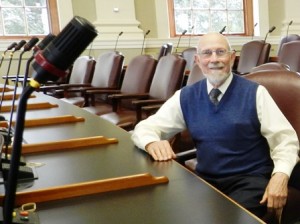 legislature during session. “Their job is to deliver messages, or documents, to the legislators,” he said. “And they love it. They don’t just observe what happens here, they are part of the process.” Our tour group today included State Representative Thomas Longstaff, one of Maine’s 151 legislators. As we sat in the House Chambers he added his comments, pointing out the colored bands on the desk microphones. “They designate what paper materials we want to receive,” Tom explained. “I have chosen to go paperless, using my laptop for retrieving the documents we need. If a mike has a yellow band, for instance, that
legislature during session. “Their job is to deliver messages, or documents, to the legislators,” he said. “And they love it. They don’t just observe what happens here, they are part of the process.” Our tour group today included State Representative Thomas Longstaff, one of Maine’s 151 legislators. As we sat in the House Chambers he added his comments, pointing out the colored bands on the desk microphones. “They designate what paper materials we want to receive,” Tom explained. “I have chosen to go paperless, using my laptop for retrieving the documents we need. If a mike has a yellow band, for instance, that 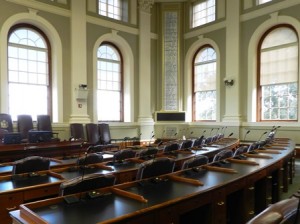 person chooses to receive a paper copy of a bill.” I looked around the room, noting yellow bands on mikes. Tom called our attention to the electronic voting board in the corner too; “In addition to the 151 legislator names,” he pointed out, “there are three more names at the bottom that represent the Maliseet, Penobscot, and Passamaquoddy tribes of Maine, and even though they are non-voting members, they have the right to speak, and introduce legislation. They are part of the process.” Our attention switched from the building itself to what happens inside of it; questions began to fly. » read more
person chooses to receive a paper copy of a bill.” I looked around the room, noting yellow bands on mikes. Tom called our attention to the electronic voting board in the corner too; “In addition to the 151 legislator names,” he pointed out, “there are three more names at the bottom that represent the Maliseet, Penobscot, and Passamaquoddy tribes of Maine, and even though they are non-voting members, they have the right to speak, and introduce legislation. They are part of the process.” Our attention switched from the building itself to what happens inside of it; questions began to fly. » read more
» posted on Saturday, September 21st, 2013 by Linda Lou Burton
Smell The Smoke
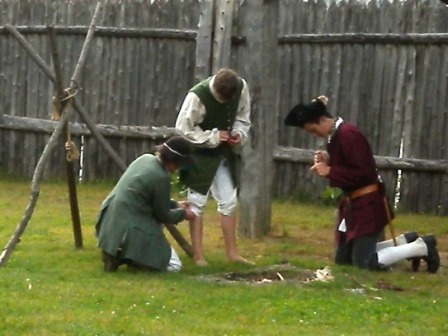 Linda Burton posting from Augusta, Maine – You can read the history books. Or you can smell the campfire smoke. Which is the better way to get a handle on the past? Dick Freeman, Chair of the Fort Western Board of Trustees, happened to be at the Fort today and talked with me after my tour; he believes we need a little of both. I smelled the smoke the minute I entered the Fort Western gate; three people in costume were just starting a fire for the afternoon demonstrations. The wisp of smoke eventually became a steady
Linda Burton posting from Augusta, Maine – You can read the history books. Or you can smell the campfire smoke. Which is the better way to get a handle on the past? Dick Freeman, Chair of the Fort Western Board of Trustees, happened to be at the Fort today and talked with me after my tour; he believes we need a little of both. I smelled the smoke the minute I entered the Fort Western gate; three people in costume were just starting a fire for the afternoon demonstrations. The wisp of smoke eventually became a steady 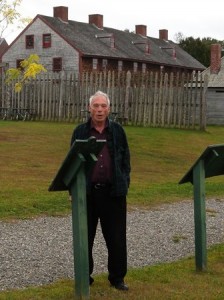 campfire; the warm smoky smell followed me the rest of the afternoon as I walked around the Fort. You know how smoke gets into your clothes; it even followed me back to my hotel. So did the stories, and images, from the Fort; I wondered if that happens with the school children who visit. They offer 17 programs to help students in grades K-12 meet selected Maine social studies standards through a visit to the Fort, or through classroom study of what happened there; they cover civics, government, citizen participation, economics, history, geography, and individual
campfire; the warm smoky smell followed me the rest of the afternoon as I walked around the Fort. You know how smoke gets into your clothes; it even followed me back to my hotel. So did the stories, and images, from the Fort; I wondered if that happens with the school children who visit. They offer 17 programs to help students in grades K-12 meet selected Maine social studies standards through a visit to the Fort, or through classroom study of what happened there; they cover civics, government, citizen participation, economics, history, geography, and individual 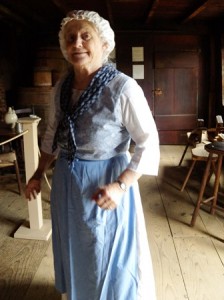 connections. Marjorie Dearborn, in costume, was my tour guide today. “The building has been restored to the time when it served as a store, and a home for the Howard family,” she explained. We looked at the merchandise on the shelves; the shoes that were made to fit either foot; the ledger that contained an entry for every item sold. In April 1774 someone bought nutmeg, and sugar and salt; in May there was a purchase of chocolate, and women’s shoes; in August it was coffee, and corn; in October Daniel Townsend bought 2 quarts of rum. Back in my room, with the smell of smoke still clinging to my clothes; I began to read the history. » read more
connections. Marjorie Dearborn, in costume, was my tour guide today. “The building has been restored to the time when it served as a store, and a home for the Howard family,” she explained. We looked at the merchandise on the shelves; the shoes that were made to fit either foot; the ledger that contained an entry for every item sold. In April 1774 someone bought nutmeg, and sugar and salt; in May there was a purchase of chocolate, and women’s shoes; in August it was coffee, and corn; in October Daniel Townsend bought 2 quarts of rum. Back in my room, with the smell of smoke still clinging to my clothes; I began to read the history. » read more
» posted on Thursday, September 19th, 2013 by Linda Lou Burton
All The Boxes
 Linda Burton posting from Augusta, Maine – If I could buy a state, I think I’d pick Maine. Now don’t get me wrong, I love all the states; some of them for their mountains, some for their shorelines, and some because they grow the food that feeds us. Some states are interesting because of their history; some are pleasant because of a great climate. Recreational opportunities, cultural activities, community spirit – all these things factor into how much we appreciate a place. And it seems to me that Maine ticks all the boxes. I’ve spent the afternoon poring over literature about Augusta so I could tell you what makes this capital city special. One thing is Fort Western, the oldest wooden fort in New England; it dates back to
Linda Burton posting from Augusta, Maine – If I could buy a state, I think I’d pick Maine. Now don’t get me wrong, I love all the states; some of them for their mountains, some for their shorelines, and some because they grow the food that feeds us. Some states are interesting because of their history; some are pleasant because of a great climate. Recreational opportunities, cultural activities, community spirit – all these things factor into how much we appreciate a place. And it seems to me that Maine ticks all the boxes. I’ve spent the afternoon poring over literature about Augusta so I could tell you what makes this capital city special. One thing is Fort Western, the oldest wooden fort in New England; it dates back to 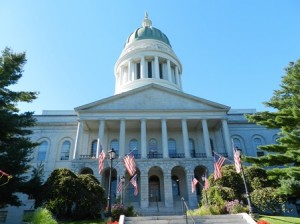 1754. I can’t wait to spend an afternoon there. And I look forward to my visit to the Maine State House – the cornerstone was laid in 1829 and the original designer was Charles Bulfinch, one of the most well-known architects of his time. The Blaine House is another beautiful historic building; it is now the Governor’s Mansion but was built as a family home by a ship’s captain in 1833 and donated to the state in 1919; there are gardens to tour as well. The Lithgow Library opened its doors to the community in 1894 and is considered one of the most
1754. I can’t wait to spend an afternoon there. And I look forward to my visit to the Maine State House – the cornerstone was laid in 1829 and the original designer was Charles Bulfinch, one of the most well-known architects of his time. The Blaine House is another beautiful historic building; it is now the Governor’s Mansion but was built as a family home by a ship’s captain in 1833 and donated to the state in 1919; there are gardens to tour as well. The Lithgow Library opened its doors to the community in 1894 and is considered one of the most  beautiful interior spaces in the state. I’m intrigued by the Holocaust and Human Rights Center in Augusta; it’s part of the University of Maine campus. It opened in 2007 and attracts national and international speakers; the University now offers a Minor in Holocaust, Genocide, and Human Rights Studies – the only program of its kind in the United States. But the most special thing about Augusta is simply that it’s in Maine. » read more
beautiful interior spaces in the state. I’m intrigued by the Holocaust and Human Rights Center in Augusta; it’s part of the University of Maine campus. It opened in 2007 and attracts national and international speakers; the University now offers a Minor in Holocaust, Genocide, and Human Rights Studies – the only program of its kind in the United States. But the most special thing about Augusta is simply that it’s in Maine. » read more
» posted on Tuesday, September 17th, 2013 by Linda Lou Burton
From Mexico To China
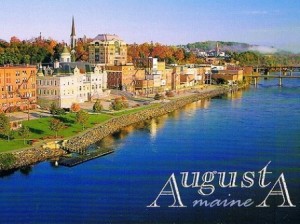 Linda Burton posting from Augusta, Maine –My target today was the easternmost capital city in the United States. I knew my drive would take me through Vermont’s Green Mountains and New Hampshire’s White Mountains before getting to Maine; from the Maine state line, the map showed twisting roads and changing highway numbers. I expected to get confused, but I didn’t expect to wind up in Mexico, or China. I’m studying the map now, trying to follow the route my GPS used to get me
Linda Burton posting from Augusta, Maine –My target today was the easternmost capital city in the United States. I knew my drive would take me through Vermont’s Green Mountains and New Hampshire’s White Mountains before getting to Maine; from the Maine state line, the map showed twisting roads and changing highway numbers. I expected to get confused, but I didn’t expect to wind up in Mexico, or China. I’m studying the map now, trying to follow the route my GPS used to get me 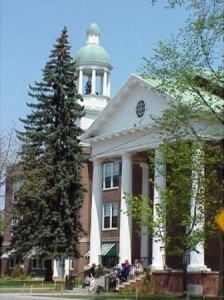 from Montpelier, Vermont to Augusta, Maine. It put me on US Highway 2 from Montpelier, and that curved me into St Johnsbury, where I disregarded its instructions long enough to drive around the postcard-pretty town; it has an incredible collection of church spires in just a few blocks, all framed by mountains. I stopped at a crosswalk on the St Johnsbury Academy campus while a crossing guard waved through a parade of young people in jackets and ties. It wasn’t far from there to the Connecticut River (Connecticut’s capital city, Hartford, is 200 miles to the south); the river separates Vermont and New Hampshire, flows through the middle of Massachusetts, divides East Hartford and West Hartford, and winds up in Long Island Sound. New Hampshire’s Live Free or Die sign welcomed me; the mountains and valleys seemed to expand. More signs; Franconia
from Montpelier, Vermont to Augusta, Maine. It put me on US Highway 2 from Montpelier, and that curved me into St Johnsbury, where I disregarded its instructions long enough to drive around the postcard-pretty town; it has an incredible collection of church spires in just a few blocks, all framed by mountains. I stopped at a crosswalk on the St Johnsbury Academy campus while a crossing guard waved through a parade of young people in jackets and ties. It wasn’t far from there to the Connecticut River (Connecticut’s capital city, Hartford, is 200 miles to the south); the river separates Vermont and New Hampshire, flows through the middle of Massachusetts, divides East Hartford and West Hartford, and winds up in Long Island Sound. New Hampshire’s Live Free or Die sign welcomed me; the mountains and valleys seemed to expand. More signs; Franconia 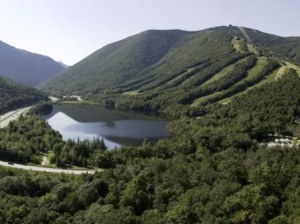 Notch, Pinkham Notch, Mt Washington (New Hampshire’s highest point at 6,288 feet). Signs for cog railways, ski runs, snowmobile routes, moose crossings. I stopped for gas at Gorham. “Where am I?” I asked, studying a Maine map posted on the wall. “You’re still in New Hampshire,” the nice lady replied, “where are you headed?” We looked for Augusta; “Follow the Androscoggin River,” she pointed, “and go to Mexico.” » read more
Notch, Pinkham Notch, Mt Washington (New Hampshire’s highest point at 6,288 feet). Signs for cog railways, ski runs, snowmobile routes, moose crossings. I stopped for gas at Gorham. “Where am I?” I asked, studying a Maine map posted on the wall. “You’re still in New Hampshire,” the nice lady replied, “where are you headed?” We looked for Augusta; “Follow the Androscoggin River,” she pointed, “and go to Mexico.” » read more
» posted on Wednesday, September 11th, 2013 by Linda Lou Burton
Meticulous Attention
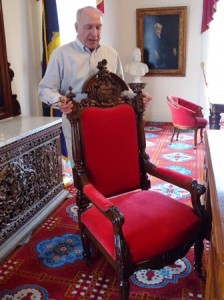 Linda Burton posting from Montpelier, Vermont – Meticulous. That’s the word. When it comes to restoration, there are two ways to go about it. You can recreate the general mood of the past – who would really know, after all? Or you can pay meticulous attention to the smallest detail. Such as the antlers on a hand-carved deer, so tiny no one would ever notice they were missing. I stood in the Governor’s Office as David Schutz, Curator for the State, pointed out the deer. It’s part of the Constitution Chair, so called because it was carved from the timbers of the frigate USS Constitution (aka Old Ironsides) and has served as the official governor’s chair since 1858. Now that’s a pretty awesomely unique chair, right there. But, as David pointed out, it suffered from years of use, and modernization. It was reupholstered with modern fabrics, and somewhere along the way, the
Linda Burton posting from Montpelier, Vermont – Meticulous. That’s the word. When it comes to restoration, there are two ways to go about it. You can recreate the general mood of the past – who would really know, after all? Or you can pay meticulous attention to the smallest detail. Such as the antlers on a hand-carved deer, so tiny no one would ever notice they were missing. I stood in the Governor’s Office as David Schutz, Curator for the State, pointed out the deer. It’s part of the Constitution Chair, so called because it was carved from the timbers of the frigate USS Constitution (aka Old Ironsides) and has served as the official governor’s chair since 1858. Now that’s a pretty awesomely unique chair, right there. But, as David pointed out, it suffered from years of use, and modernization. It was reupholstered with modern fabrics, and somewhere along the way, the 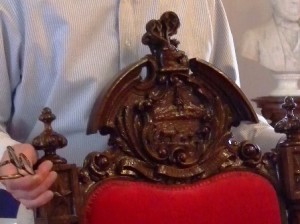 delicate antlers of the deer were broken off. During the restoration of 1985, the decision was made to restore the chair, and give the deer its antlers back. But not just any wood was used. A trip was made to Boston, where the USS Constitution is berthed for public tours. By special arrangement, a small piece of “Constitution timber” was obtained from which to
delicate antlers of the deer were broken off. During the restoration of 1985, the decision was made to restore the chair, and give the deer its antlers back. But not just any wood was used. A trip was made to Boston, where the USS Constitution is berthed for public tours. By special arrangement, a small piece of “Constitution timber” was obtained from which to  carve new antlers for the deer; the Constitution Chair was made whole again. Meticulous. There’s another word that describes the Vermont State House, and that word is “intimate.” The building nestles between the river and the hills; inside its granite walls there’s warmth and color in every room. It has a cozy feel, but touches everywhere that make it grand; soft red velvet draped against shuttered windows; gilt-bronze radiator screens with delicate patterns of cast-iron curving vines; tiny warrior cherubs perched on the gasoliers. » read more
carve new antlers for the deer; the Constitution Chair was made whole again. Meticulous. There’s another word that describes the Vermont State House, and that word is “intimate.” The building nestles between the river and the hills; inside its granite walls there’s warmth and color in every room. It has a cozy feel, but touches everywhere that make it grand; soft red velvet draped against shuttered windows; gilt-bronze radiator screens with delicate patterns of cast-iron curving vines; tiny warrior cherubs perched on the gasoliers. » read more
» posted on Saturday, September 7th, 2013 by Linda Lou Burton
Stop Off At Exit 8
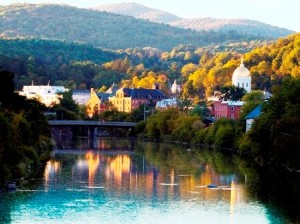 Linda Burton posting from Montpelier, Vermont – “There’s no other capital quite like it.” That’s the answer; the question is: why Montpelier, Vermont? I’m reading the brochure I picked up at the Information Center on I-89 near Sharon. Why Montpelier? See for yourself, the brochure implores; stop off at Exit 8 and experience the architecture, art, artisan beers, restaurants, shopping, music, café culture, river walks, and stunning views in the smallest state capital in the United States. Smallest it is, with a population of 7,855 (US Census 2010); the next smallest is Pierre, South Dakota, which is almost twice as big; and then Augusta, Maine, my next
Linda Burton posting from Montpelier, Vermont – “There’s no other capital quite like it.” That’s the answer; the question is: why Montpelier, Vermont? I’m reading the brochure I picked up at the Information Center on I-89 near Sharon. Why Montpelier? See for yourself, the brochure implores; stop off at Exit 8 and experience the architecture, art, artisan beers, restaurants, shopping, music, café culture, river walks, and stunning views in the smallest state capital in the United States. Smallest it is, with a population of 7,855 (US Census 2010); the next smallest is Pierre, South Dakota, which is almost twice as big; and then Augusta, Maine, my next 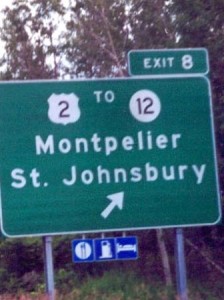 stop, with a population of 19,136 (US Census 2010). Tucked in a quiet Vermont valley, on the Winooski River, centrally located. Stay in Montpelier, the brochure continues. Unfortunately, none of the hotels in Montpelier are pet-friendly, so I’m forced to stay 35-miles away in Burlington, Vermont’s largest city (where Alex and Jack are welcome at the pet-friendly LaQuinta chain, as always). Peter, the helpful volunteer at the Information
stop, with a population of 19,136 (US Census 2010). Tucked in a quiet Vermont valley, on the Winooski River, centrally located. Stay in Montpelier, the brochure continues. Unfortunately, none of the hotels in Montpelier are pet-friendly, so I’m forced to stay 35-miles away in Burlington, Vermont’s largest city (where Alex and Jack are welcome at the pet-friendly LaQuinta chain, as always). Peter, the helpful volunteer at the Information 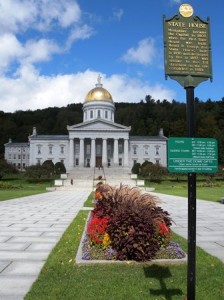 Center, had commiserated with me on that problem; “We travel with pets too. I wish hotel owners were a little more understanding.” He made some calls to find a place in Montpelier I hadn’t already tried; no luck. So I’ll be driving into Montpelier; I’ll stop off at Exit 8 to check out the architecture, restaurants, and general ambiance; today I’m making up my list. The brochure offers suggestions for a day, starting with morning at the golden-domed State House and a guided tour. Maybe a hike in Hubbard Park? Some of the trails wind through the woods just behind the State House, and there’s an observation tower for those promised stunning views. Sounds interesting, I’m warming up. Then, afternoon? » read more
Center, had commiserated with me on that problem; “We travel with pets too. I wish hotel owners were a little more understanding.” He made some calls to find a place in Montpelier I hadn’t already tried; no luck. So I’ll be driving into Montpelier; I’ll stop off at Exit 8 to check out the architecture, restaurants, and general ambiance; today I’m making up my list. The brochure offers suggestions for a day, starting with morning at the golden-domed State House and a guided tour. Maybe a hike in Hubbard Park? Some of the trails wind through the woods just behind the State House, and there’s an observation tower for those promised stunning views. Sounds interesting, I’m warming up. Then, afternoon? » read more
» posted on Thursday, September 5th, 2013 by Linda Lou Burton
Swimming Upstream
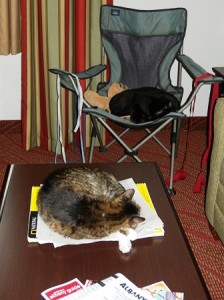 Linda Burton posting from Albany, New York – The cats are snoozing but I’m busy. Today I’m wrapping up 80% of the Journey Across America as we end our stay in the 40th capital city. For the last two months, I feel like I’ve been a salmon swimming upstream, going backwards in history. In Saint Paul, I learned about Pigs Eye Parrant and Lucien Galtier, two names that are part of the city’s beginnings. Pigs Eye moved west from Michigan; Father Galtier came from France by order of Rome and only stayed long enough to establish a church and push for the city name of Saint Paul instead of Pigs Eye. Remember them? In Madison, I learned about James Doty, who came from New York; he lived in Detroit before he bought the land that he platted into the city of Madison; then he
Linda Burton posting from Albany, New York – The cats are snoozing but I’m busy. Today I’m wrapping up 80% of the Journey Across America as we end our stay in the 40th capital city. For the last two months, I feel like I’ve been a salmon swimming upstream, going backwards in history. In Saint Paul, I learned about Pigs Eye Parrant and Lucien Galtier, two names that are part of the city’s beginnings. Pigs Eye moved west from Michigan; Father Galtier came from France by order of Rome and only stayed long enough to establish a church and push for the city name of Saint Paul instead of Pigs Eye. Remember them? In Madison, I learned about James Doty, who came from New York; he lived in Detroit before he bought the land that he platted into the city of Madison; then he  worked for Wisconsin statehood. (Wisconsin is still miffed over the fact that a huge chunk of land to the north belongs to Michigan, even though it is not connected to Michigan, but is a part of Wisconsin’s geography.) From there I continued east to Michigan, and Lansing, (where that huge chunk of land is justified in the land divvy-up because “Ohio got the Toledo Strip, so we got the Upper Peninsula!”). Lansing was settled because in 1835 two slick-talkers scammed some folks in Lansing, New York, who then came and settled that part of Michigan and named their new city Lansing. Meanwhile, down in Ohio,
worked for Wisconsin statehood. (Wisconsin is still miffed over the fact that a huge chunk of land to the north belongs to Michigan, even though it is not connected to Michigan, but is a part of Wisconsin’s geography.) From there I continued east to Michigan, and Lansing, (where that huge chunk of land is justified in the land divvy-up because “Ohio got the Toledo Strip, so we got the Upper Peninsula!”). Lansing was settled because in 1835 two slick-talkers scammed some folks in Lansing, New York, who then came and settled that part of Michigan and named their new city Lansing. Meanwhile, down in Ohio, 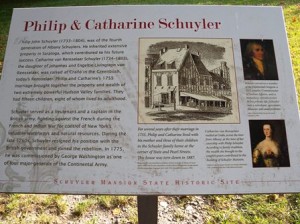 Columbus was settled by miners and farmers and entrepreneurs coming in via the National Road from Maryland, and a lot of former New Yorkers. Now I’m in New York; here everybody talks about Henry Hudson; Dutch names such as Van Rensselaer and Schuyler are on every post; and events of the 1600s are common conversation. History is a long-running soap opera. And I love it! » read more
Columbus was settled by miners and farmers and entrepreneurs coming in via the National Road from Maryland, and a lot of former New Yorkers. Now I’m in New York; here everybody talks about Henry Hudson; Dutch names such as Van Rensselaer and Schuyler are on every post; and events of the 1600s are common conversation. History is a long-running soap opera. And I love it! » read more
